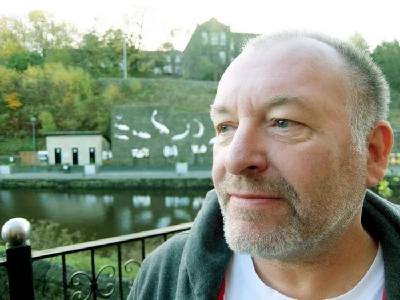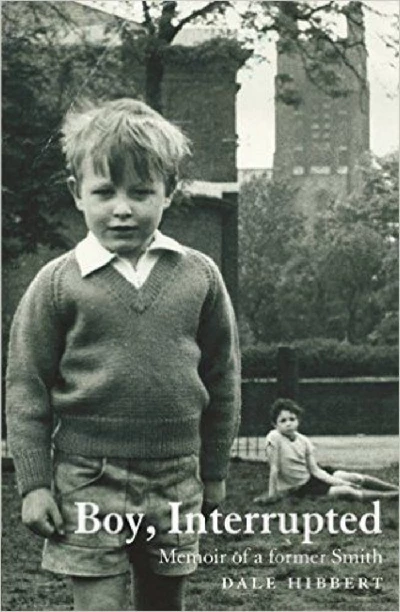published: 8 /
3 /
2016

On the back of his recent book, 'Boy, Interrupted', original Smiths’ bassist Dale Hibbert opens up to Dixie Ernill about his life both in and out of music.
Article
The Smiths are viewed by many as one of the greatest and most important UK bands of all time. In the near thirty years since they split, their singer, Morrissey, on the back of an established solo career, and guitarist, Johnny Marr, via session work and more recently his own solo career, have maintained a high media presence. Even the drummer Mike Joyce and bassist Andy Rourke have managed to remain in the public eye due to their Smiths’ connection. Dale Hibbert who was actually the first member to join Morrissey and Marr in the newly formed band and was influential in the early demo’s due to his position at a local studio, however, seemed to slip all too easily from view and in some minds his involvement has been papered over almost entirely. The fact is he was the original bassist, played on the first demos and performed at the band’s first concert at The Ritz in Manchester on 4 October 1982. He was a member of the Smiths and no amount of poetic licence can deny that.
He recently released a book 'Boy, Interrupted' - a memoir about his life. Even ignoring his involvement in the Smiths (which is fascinatingly captured in the book), Dale Hibbert has lived (and continues to live) one hell of a life. Here he opens up to Pennyblack:-
PB: In the book you mention that you don’t have regrets, but do wish that you had at least still been in the band when the first record had been realised and do you think you would have been viewed differently in the many books about the Smiths if you had been on the first record?
DH: This is the first time anyone has posed this question differently. In the past it has been black and white. I have considered the content, and yes, I would have liked to have played on the first single, rather than the demo. In my opinion this would have cemented me as a “former member” rather than an observer and recounter of tales.
PB: You mention that at the time you were a member of the Smiths you thought they were a good band, but maybe not as good as some of the other up and coming bands you heard and/or had in the recording studio where you worked. Did any of these bands make a name for themselves and what do you think was the difference between the Smiths making it while others didn’t?
DH: Some made it Carmel for example, without stating the obvious band names from that time. Johnny and Steven had a uniqueness that really only existed when they were in partnership. The contacts that they had were clearly an advantage, but this shouldn’t detract from their ability.
PB: It has often been suggested that the Smiths were pretty original when they arrived, but following the recent sad death of Colin Vearncombe (singer from Black - DE), I have heard Black’s debut single from 1981 ('Human Features') that sounds very similar to the early work of the Smiths, but pre-dates it by at least a year. Do you know if Morrissey or Marr were influenced by Black or is this just coincidence?
DH: I wasn’t aware of this song, so had a listen. There is more than a passing resemblance. If forced I would say it was coincidence. This song is reminiscent of quite a few demos I heard in those days. When I was with Johnny and Steven, the only music they played me was early 60’s. They didn’t allude to any contemporary influences.
PB: What is your favourite Smiths’ song?
DH: 'Asleep'. This is based around the piano outro on 'Suffer', composed and played by Johnny.
PB: Music has clearly played a significant role in your life. Who were the bands that you admired when growing up in Manchester in the late 70’s/early 80’s and have any artists caught your ear in recent times?
DH: My first musical hero was Elton John. We are talking about the 'Tumbleweed Connection' era. I then became heavily fanatical about the Velvet Underground. When I got the chance to work with Nico, it was a situation that I could never have imagined when listening as a child.
Recently, the Slow Show, Chinawoman, Daughter (first album), a decade ago Missy Higgins, Placebo, Tindersticks.
PB: Moving away from music, do you think the fact that you never knew your mother effected the way your own relationships have panned out?
DH: Absolutely, I recognise that I have craved for female companionship, love, adoration. This has ruled my life like a tyrant. Of course I cannot say with certainty that the loss of my mother was causal in this, but I strongly suspect that this desire would not have been so overpowering if I had a mother waiting to tell me “everything would be alright”. People laugh when I say this, but I truly didn’t believe women farted till I was sixteen. The pedestal was so high.
PB: Your book seems to be a very honest account of your life – were there some areas that your wanted to gloss over?
DH: No, I wrote it for my children. As such it had to be as honest as I could be, without causing pain to people I have loved.
PB: You have lived in a few different countries, but seem to be settled in Todmorden. Do you still have wanderlust and are there any countries/places you would really like to visit?
DH: I want to see Cuba before it becomes sanitised, so I’d best get my skates on. We will retire in either the Czech Republic or the Ukraine.
PB: Have you seen the recent TV series 'Happy Valley', set in and around Todmorden and how realistic do you think it is?
DH: I watched series one, and enjoyed it. I guess TV is always more enjoyable when you recognise the locations. Is it realistic? It’s as realistic as 'Coronation Street'. You can’t fail to smell the dope in Tod, but the same can be said for Chorlton and Whalley Range.
PB: Coffee is your game now and I must admit to never having taken to it. What coffee would you recommend to a novice like me and what is your favourite coffee?
DH: I would recommend a latte, velvety smooth textured milk, viewed as a child’s drink in most countries, but have to admit it was my drink of choice for many years. These days it’s a flat white, made the way it should be. An eight ounce glass, a ristretto base rather than espresso, finely textured milk. Problem is that most coffee houses simply don’t know how to make it. The chains fail miserably, which gives the flat white a bit of a bad name. My favourite coffee, as opposed to preparation of coffee is our blend. (A mix of beans from Peru, India and El Salvador)
PB: Finally, any plans musically or will you forever remain an ex-Smith?
DH: We (my partner Svet, a classically trained violinist) could be found on Charles Bridge in Prague busking, then sometimes in Berlin. It kept us in beer and food for quite some time. The music we have made over the past ten years can be found at https://soundcloud.com/petrin-hill. I have high hopes for my daughter Blossom. She is composing some outstanding work.
PB; Thank you.
Band Links:-
http://www.pomonauk.com/books/dalehibb
Picture Gallery:-
